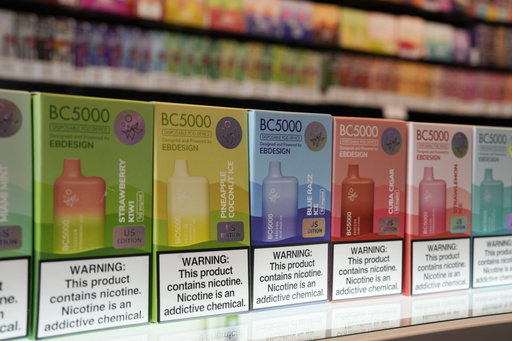
SACRAMENTO, Calif. — A new piece of legislation introduced by California lawmakers on Wednesday could lead to a ban on the sale of disposable vaping products, a move designed to mitigate plastic waste within the state.
In recent years, California has enacted several laws aimed at reducing single-use plastics, including bans on plastic carryout bags in grocery stores, Styrofoam food containers, and plastic bottles in hotels. The proposed bill, if passed, would specifically focus on disposable vapes, which are battery-operated devices that typically contain nicotine or cannabis in an aerosolized form, often infused with various flavorings and chemicals. Both refillable and disposable varieties exist, but the focus of this legislation is on the products engineered for single use.
Globally, several countries have explored or instituted bans on single-use vape products, with a new law starting in Belgium on January 1 and an upcoming ban expected to be enforced in the United Kingdom in June. Should California proceed with the ban, it would become the first U.S. state to implement such regulations, following unsuccessful attempts in California and New York previously.
If the bill is enacted, the selling or distributing of new or refurbished disposable vapes in California would be prohibited beginning January 1, 2026. Local authorities or state bodies would have the power to impose fines: $500 for a first violation, $1,000 for a second, and $2,000 for any further breaches of the law.
Assemblymember Jacqui Irwin, the bill’s author, emphasized the importance of this legislation in preventing battery acid from these single-use products from contaminating land and water sources. “We must transition away from these harmful single-use devices, and AB 762 will do just that,” Irwin stated during a news conference in Sacramento.
Opponents of the proposal, such as the California Grocers Association, express concern that similar attempts in 2022 could drive up tobacco smuggling activities. Additionally, Arkan Somo, co-founder of the Neighborhood Market Association, highlighted the financial strain that this new legislation could impose on family-run tobacco shops. “If we’re going to use the environment as justifications for these bans, where does it end?” he questioned, arguing that the regulations could place California businesses at a significant disadvantage.
California has adopted various measures to regulate vape sales in recent years; for instance, Governor Gavin Newsom signed legislation in 2020 to prohibit the sale of most flavored tobacco products in a bid to protect minors. Notably, more than 30 states, including California, have implemented taxes on e-cigarettes, reflecting ongoing efforts to address public health concerns related to vaping. All U.S. states also have established laws banning the sale of e-cigarettes to minors.
“These products not only pollute our environment, but they also prey on our most vulnerable population—our children,” said Tony Hackett, a policy associate with Californians Against Waste, a nonprofit advocating for the bill. “Disposable vapes are crafted for maximum addiction while offering minimal accountability.”
Disposable vapes are often preferred due to their lower prices and ease of accessibility compared to refillable ones, as explained by Carolina Saavedra, a staff attorney with the Public Health Law Center. However, the waste generated from e-cigarettes poses significant risks, containing heavy metals and hazardous lithium-ion batteries that can ignite. Saavedra described the California bill as an “exciting step” toward resolving these issues.
“Continuing to shine a light on the high costs associated with this problem, alongside the negligible benefits that these products provide, is crucial,” she declared.

